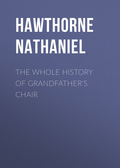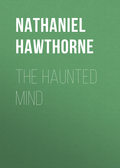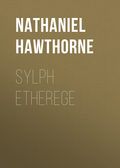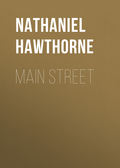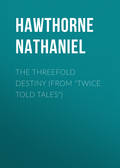
Натаниель Готорн
Fragments from the Journal of a Solitary Man
“I passed not one step farther, but threw my eyes on a looking-glass which stood deep within the nearest shop. At first glimpse of my own figure I awoke, with a horrible sensation of self-terror and self-loathing. No wonder that the affrighted city fled! I had been promenading Broadway in my shroud!”
I should be doing injustice to my friend’s memory, were I to publish other extracts even nearer to insanity than this, front the scarcely legible papers before me. I gather from them – for I do not remember that he ever related to me the circumstances – that he once made a journey, chiefly on foot, to Niagara. Some conduct of the friends among whom he resided in his native village was constructed by him into oppression. These were the friends to whose care he had been committed by his parents, who died when Oberon was about twelve years of age. Though he had always been treated by them with the most uniform kindness, and though a favorite among the people of the village rather on account of the sympathy which they felt in his situation than from any merit of his own, such was the waywardness of his temper, that on a slight provocation he ran away from the home that sheltered him, expressing openly his determination to die sooner than return to the detested spot. A severe illness overtook him after he had been absent about four months. While ill, he felt how unsoothing were the kindest looks and tones of strangers. He rose from his sick-bed a better man, and determined upon a speedy self-atonement by returning to his native town. There he lived, solitary and sad, but forgiven and cherished by his friends, till the day he died. That part of the journal which contained a description of this journey is mostly destroyed. Here and there is a fragment. I cannot select, for the pages are very scanty; but I do not withhold the following fragments, because they indicate a better and more cheerful frame of mind than the foregoing.
“On reaching the ferry-house, a rude structure of boards at the foot of the cliff, I found several of those wretches devoid of poetry, and lost some of my own poetry by contact with them. The hut was crowded by a party of provincials, – a simple and merry set, who had spent the afternoon fishing near the Falls, and were bartering black and white bass and eels for the ferryman’s whiskey. A greyhound and three spaniels, brutes of much more grace and decorous demeanor than their masters, sat at the door. A few yards off, yet wholly unnoticed by the dogs, was a beautiful fox, whose countenance betokened all the sagacity attributed to him in ancient fable. He had a comfortable bed of straw in an old barrel, whither he retreated, flourishing his bushy tail as I made a step towards him, but soon came forth and surveyed me with a keen and intelligent eye. The Canadians bartered their fish and drank their whiskey, and were loquacious on trifling subjects, and merry at simple jests, with as little regard to the scenery as they could have to the flattest part of the Grand Canal. Nor was I entitled to despise them; for I amused myself with all those foolish matters of fishermen, and dogs, and fox, just as if Sublimity and Beauty were not married at that place and moment; as if their nuptial band were not the brightest of all rainbows on the opposite shore; as if the gray precipice were not frowning above my head and Niagara thundering around me.
“The grim ferryman, a black-whiskered giant, half drunk withal, now thrust the Canadians by main force out of his door, launched a boat, and bade me sit in the stern-sheets. Where we crossed the river was white with foam, yet did not offer much resistance to a straight passage, which brought us close to the outer edge of the American falls. The rainbow vanished as we neared its misty base, and when I leaped ashore, the sun had left all Niagara in shadow.”
“A sound of merriment, sweet voices and girlish laughter, came dancing through the solemn roar of waters. In old times, when the French, and afterwards the English, held garrisons near Niagara, it used to be deemed a feat worthy of a soldier, a frontier man, or an Indian, to cross the rapids to Goat Island. As the country became less rude and warlike, a long space intervened, in which it was but half believed, by a faint and doubtful tradition, that mortal foot bad never trod this wild spot of precipice and forest clinging between two cataracts. The island is no longer a tangled forest, but a grove of stately trees, with grassy intervals about their roots and woodland paths among their trunks.
“There was neither soldier nor Indian here now, but a vision of three lovely girls, running brief races through the broken sunshine of the grove, hiding behind the trees, and pelting each other with the cones of the pine. When their sport had brought them near me, it so happened that one of the party ran up and shook me by the band, – a greeting which I heartily returned, and would have done the same had it been tenderer. I had known this wild little black-eyed lass in my youth and her childhood, before I had commenced my rambles.
“We met on terms of freedom and kindness, which elder ladies might have thought unsuitable with a gentleman of my description. When I alluded to the two fair strangers, she shouted after them by their Christian names, at which summons, with grave dignity, they drew near, and honored me with a distant courtesy. They were from the upper part of Vermont. Whether sisters, or cousins, or at all related to each other, I cannot tell; but they are planted in my memory like ‘two twin roses on one stem,’ with the fresh dew in both their bosoms; and when I would have pure and pleasant thoughts, I think of them. Neither of them could have seen seventeen years. They both were of a height, and that a moderate one. The rose-bloom of their cheeks could hardly be called bright in her who was the rosiest, nor faint, though a shade less deep, in her companion. Both had delicate eyebrows, not strongly defined, yet somewhat darker than their hair; both had small sweet mouths, maiden mouths, of not so warns and deep a tint as ruby, but only red as the reddest rose; each had those gems, the rarest, the most precious, a pair of clear, soft bright blue eyes. Their style of dress was similar; one had on a black silk gown, with a stomacher of velvet, and scalloped cuffs of the same from the wrist to the elbow; the other wore cuffs and stomacher of the like pattern and material, over a gown of crimson silk. The dress was rather heavy for their slight figures, but suited to September. They and the darker beauty all carried their straw bonnets in their hands.”



